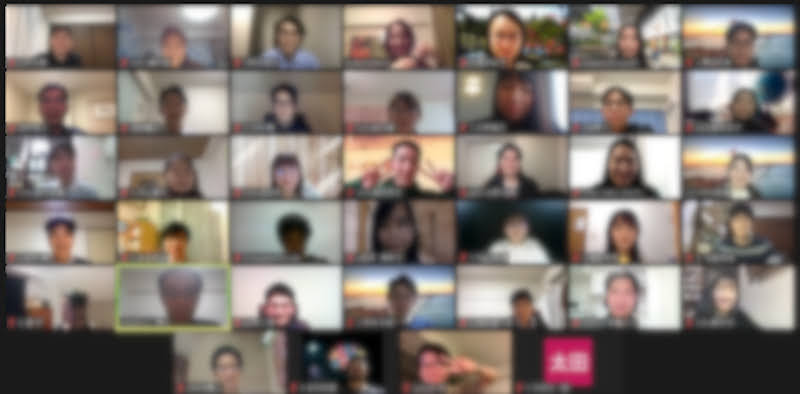- HOME
- Activities
- Event List
- Event Details
2021.3.13 KIP Symposium “Expectations for young leaders under the state of emergency”

An on-line Symposium connecting five cities around the world was held. In the first part, we had the 2020 project " A Role of Sending the Messages and A Responsibility of Communicating with People about Natural Disasters” Report. In the second part, we had the panel discussion "Expectations for young leaders under the state of emergency", and the group discussion "Should we let Japanese leader to have authority in an emergency?" As panelists for the second part, we welcomed KIP members, Hayato Nakamura who lives in Bangkok, Yuko Yokoi who lives in New York, Luka Ishino who lives in Paris, and Akira Endo who lives in London.
Biography
Mr. Hayato Nakamura
He is currently working for a major bank in Thailand. He graduated from University in 2016.
Ms.Luka Ishino
She has been studying abroad at Institut d'Etudes Politiques de Paris since last September. She is in first year at the University of Tokyo Graduate School of Public Policy.
Mr. Akira Endo
He is currently enrolled in the doctoral program at the University of London. He graduated from undergraduate school in 2017.
Ms. Yuko Yokoi
She is currently an intern at an international NGO. She studied abroad at New York University after her graduation from University in 2018.
In the first part, we had the KIP project 2020 report entitled " A Role of Sending the Messages and A Responsibility of Communicating with People about Natural Disasters.” KIP project 2020 members introduced the mechanism by which reputational damage occurs based on survey research which is cooperated with more than 1,000 people, regional study trip in Kochi and the interview.
In the process of causing reputational damage, it is necessary to pay attention to four actors and media: (1) SNS, (2) mass media, (3) administration, and (4) citizens. They described that as online communication became mainstream, and the relationship of the society got weaker, reputational damage could be easily caused in the process of communication even if there is no malicious intent. I felt the importance of conducting risk communication at the local level, realizing that "I could be the perpetrator of reputational damage."
In the first half of the second part, the panelists living in foreign countries explained the local situation and the political decision-making under the covid-19 pandemic. Through the comparison of political judgement in each country and in Japan, we examined what feature is required for a Japanese leader.
Mr. Nakamura, who lives in Thailand, introduced the quick and strict judgement of the government, presenting the history of Thailand as a constitutional monarchy. He said that he, as a foreign worker, felt no dissatisfaction toward the government, while there are large-scale anti-establishment demonstrations have occurred in Thailand. Ms. Ishino told that in France, the effect of President Macron’s prompt judgement, clear and sympathetic form of transmitting information is highly evaluated. Through the talk that the media play their role appropriately, I felt the importance of clear risk communication from leaders. Mr. Endo taught us about the countermeasures against covid-19 in the UK form the perspective of its strengths and weaknesses. One of its strengths is the research initiative, with several large-scale researches referred and compared in trying to take appropriate measures. He also pointed out high quality coverage in the UK. Ms. Yokoi introduced that racial and gender-based inequality is increasing in the US under the pandemic. She mentioned that during December, approximately 150,000 people were unemployed, which were all women. She made me realize that vulnerable people like African Americans and women are exposed to harsher situation in the emergency.
Through comparison with the leaders of each country, I thought Japanese leader is required three features - Evidence-based speedy decision-making, Clarification of responsibility, and Empathetic delivery. On the other hand, the importance of considering the unique national character, historical background, and the value of human rights was also pointed out. In the latter half of the second part, we had a group discussion on the theme of "Should we let Japanese leader to have authority in an emergency?" While many groups agreed the statement, the necessity to ensure the correctness of leaders' political decisions was emphasized. The discussion got lively dealing with several topics like "national feelings toward giving great power to leaders" and "differences between authority and leadership".
At KIP's first online symposium, we received live voices from foreign country thanks to Mr. Nakamura, Mr. Yokoi, Mr. Ishino, and Mr. Endo. This year, while the spread of Covid-19 forced economic and social changes, I think there were also positive changes such as being able to talk online in this way.
We sincerely appreciate KIP directors, alumni, students, and all the people who cooperated for this symposium. Thank you very much.
Mio Nakayama, Waseda University 2nd, School of Political Science and Economics


